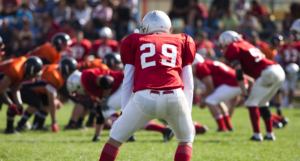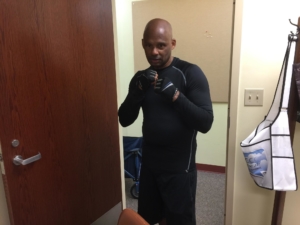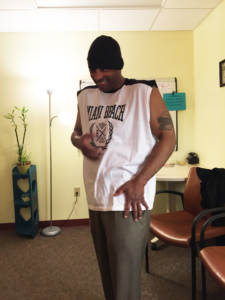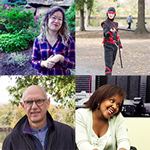Faces Behind the Screen: Reggie Andrade
Quick Links
<< Return to all “Faces Behind the Screen” stories
Part 1
As a child, I was passionate about sports. Most of the friends I had growing up all excelled at sports.
I made a name for myself in my community from the age of probably eight years old. I started playing football and I was one of the fastest on the field. I also ran track and field and was one of the top sprinters in the state. I was inducted into both my high school football and track hall of fame. My mother would put all of my trophies in the house on the mantle above the fireplace.
I grew up in Bedford, Massachusetts, in the west end of the city. We lived right across the street from The Boys Club. Back then, it wasn’t called The Boys and Girls Club. It was The Boys Club of America.
When I was in the first grade, my mother signed me up for The Boys Club. I had no idea what it was, but she persuaded me to go.
On the first day, I immediately loved The Boys Club. So much so that the next day, I was in the bathroom at two o’clock in the morning brushing my teeth. I didn’t realize it at the time, but I was sleepwalking. My mother came into the bathroom saying, “what are you doing?” I said, “mom, I’m brushing my teeth. I’m going to the Boys Club!”
One day in the second grade, I couldn’t see the blackboard. I told my mom about it and she took me to the eye doctor to get tested. I was diagnosed with an eye condition called Stargardt Disease, which was discovered by an optometrist from Germany named Karl Stargardt. Stargardt Disease affects visual acuity and makes it hard to see small print.
Even with a disability, I earned a full athletic scholarship to the University of Massachusetts. While in college, it was difficult to access information. There were no screen readers or other accessibility tools.
Academically, I seemed to always lag behind because of my visual impairment. It was difficult because I couldn’t see the board and textbooks were inaccessible. However, once technology started making some advances, learning became a lot easier for me.
Part 2
When the breakthrough of innovative assistive technology tools came through in the mid-’90s, it helped me jump hurdles. I still had to work hard, and it was difficult at times, but it became easier for me because I was able to get textbooks on tape and listen to the audio line by line.
I’ve been able to navigate the digital space by using assistive technology which is helpful for people with visual impairments. JAWS is a screen reader program that works with the internet, email, and word processing programs like Microsoft office. Most programs are accessible with JAWS and I rely upon it to perform daily tasks.
Sometimes I wonder how I really went through it. I mean, I was always a good student, a fine athlete, and got along well with people socially. However, many blind individuals are limited when they don’t have access to things that everyone else has access to.
People with disabilities have to go through a lot. We have to overcome a lot of challenges and barriers.
Even to this day, not everything is really all accessible. Many places of business like the grocery store or retail stores are not accessible. If I want to buy clothes in a store, I’m not able to see the size or the price of the item. The print is so tiny that I have to rely on other individuals to assist me in order to make a basic purchase.
A common mistake sighted people make when interacting with blind and low vision people is asking annoying questions like, “hey, can you see that? I know you can’t see that.” Everyone has different visual acuity. Don’t just assume that blindness is all or nothing.
One assistive tool that I love is audio description. It helps me fully enjoy some of my favorite shows and movies. I was invited by a major telecommunications company to participate in a discussion about accessibility and television. I was able to give input on ways to make their services more accessible for people with disabilities, which was huge because it really paved the way for the industry.
My advice for web developers is to think about accessibility at the forefront of the design process. Ask if your website or app is accessible to everyone, including those who may have a visual, hearing, or other disability. It shouldn’t be an afterthought.
It is not that complicated to make a web page accessible. All websites should utilize universal design. Unfortunately, in many cases, people start rethinking their design after someone complains or files a lawsuit.
Developers should be trained and educated on web accessibility. If you’re a business, wouldn’t you want your product or service to be accessible to everyone? There are a lot of people with visual impairments. Companies like Apple have accessibility built into their products so that people with disabilities can use them.
Part 3
The proudest moment of my life was graduating and receiving my undergraduate degree. I and people who were in my inner circle knew the amount of blood, sweat, and tears that went into my academic progress.
Another proud moment was when I received a Carroll Award from the Carroll Center for the Blind in Newton, MA. I was recognized for being a low-vision employee who made significant contributions in the workplace.
I found that I have to work harder than sighted individuals. Sometimes it may take me longer to complete a task because I have to use and remember certain keystroke commands and shortcuts to do my work.
Fortunately, I work for a disability services office where most people understand accessibility. Whenever I need a document, they send it to me electronically so I can use text-to-speech technology to understand the information.
I learned early on to ask for help if I need support. If you don’t ask, you don’t get it. It may not be comfortable disclosing your disability, but you have to advocate for yourself. Sometimes people don’t get it, and sometimes they never will unless they’re properly educated about certain disabilities.
I am a Case Manager at the disability services office at the University of Massachusetts Amherst. I work with students who have a variety of disabilities looking for accommodations. We provide accommodations so that they can be on an even playing field with other students.
It’s an extremely rewarding job. We provide a lot of support for these students and give them the tools they need to succeed. Most students are extremely grateful because they’re able to pass a course, graduate from university, and move on to a career. I used to go to disability services when I was in college in order for me to get a degree. I know first hand how you can change and improve someone’s life just by offering basic accommodations.
As a man with limited vision, I’m able to live a fulfilling life. I have a passion for being happy, smiling, and having a purpose in life. When I get up every day I look forward to doing something.
There are many resources out there. People on the local and national level are making strides in accessibility. You have to overcome a lot of obstacles, but turn into something positive. You can do anything you put your mind to – even if you have a disability.
—
Faces Behind the Screen would like to thank Reggie Andrade for participating in our storytelling project. If you’re interested in sharing your story with us, fill out our nomination form.
Faces Behind the Screen is a storytelling project focusing on members of the Deaf and hard of hearing community.






